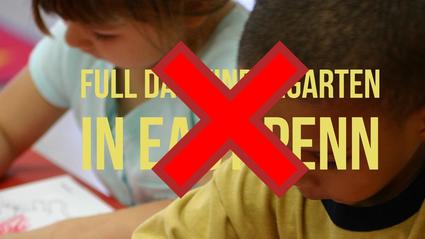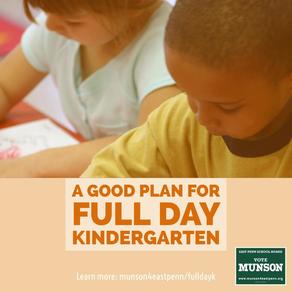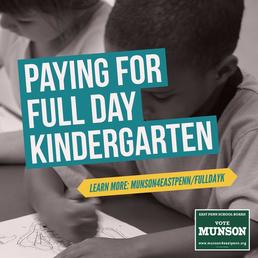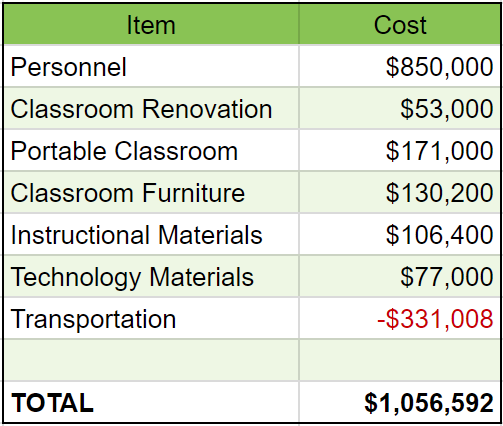 I'm saddened to report that last night the East Penn School Board defeated the plan to offer the community full day kindergarten, by a vote of 4-5. I voted in favor of the plan, along with Ken Bacher, Paul Champagne, and Alan Earnshaw. Voting against the plan were Carol Allen, Chuck Ballard, Chris Donatelli, Rebecca Heid, and Wally Vinovskis. Some of the school board members who defeated the plan gave no reasons at all for their vote. Others gave differing reasons, including raising concerns about the proposal that I share. Nothing in the discussion, however, changed my own view that full day kindergarten had benefits that far outweighed its drawbacks, was sorely needed in our rapidly changing community, and was affordable to district taxpayers. (I made my views on these issues public well in advance of the meeting, which you can review here.) What You Can Do I remain optimistic about our East Penn schools and committed to promoting and improving public education that serves the common good. This won't be the last important issue to come before the school board. Regardless of your feelings about full day kindergarten, if you would like to have a greater voice in the direction of our schools, I encourage you to:
1 Comment
 The East Penn School Board will vote soon on whether to offer full day kindergarten to all families in the district. I’m strongly in favor of doing so. I’ve already written about some of the benefits of full day kindergarten, our community’s need for it, and paying for the program. The methodical, inclusive, and transparent planning process the district used to develop its full day kindergarten proposal gives me added confidence that it will be successful and is worthy of support. Developing the plan for all day kindergarten began in early 2016. It involved a committee consisting of school administrators, teachers, parents, and community members. They investigated best practices as well as reviewed the voluminous research devoted to evaluating full day kindergarten programs. They compiled data on our own district, conducted a survey of more than 2,000 community stakeholders, and developed a specific vision for a play-centered full day program. And they completed a full inventory of the space available in each school, examined current teacher allocation, and considered a whole host of potential effects of the change, including how it might impact the number of students attending private kindergartens, the number of seats on buses, “worst case scenarios,” and so forth. The committee kept the school board informed of their progress through a series of presentations over the last year. The slides from those presentations contain a wealth of information about the proposal and how it evolved, and are available below: Assistant Superintendent Kristen Campbell led this effort. It has been the most thorough and compelling of any the district has done in my four years on the board. My own research and discussions with community members have led me to approve of full day kindergarten in principle. But my confidence in East Penn’s specific proposal has come in large part because of the thoroughness and professionalism with which Ms. Campbell and her team have developed their. I’ve come to the conclusion that full day kindergarten is right for our district. What do you think? This is one of several posts on the full day kindergarten proposal. You can learn more at: 
The East Penn School Board will vote soon on whether to offer full day kindergarten to all families in the district. I’m strongly in favor of doing so. I’ve already outlined some of the benefits of full day kindergarten, as well as our community’s need for it. But how do we pay for it?
The best estimate of the costs for a district wide full day kindergarten program is $1.1 million in the first year, and about $520,000 in subsequent years. This represents about 0.8% of the district’s total budget in the first year, and 0.4% of the budget in the following years. First Year Full Day Kindergarten Cost Estimate
The good news is that the money for full day kindergarten does not necessarily have to come from higher taxes. This is because the district will finish paying some debts this year, resulting in a $2.7 million dollar savings in debt costs in 2018-2019. These savings will more than cover the costs of full day kindergarten, with over $1.6 million left to be potentially used for both tax relief and other educational programs.
Universal full day kindergarten also helps the district use its tax dollars more efficiently. Our current half day programs require additional school bus runs during the day. Moving to full day kindergarten allows the district to save approximately $330,000 annually on reduced busing costs (included in the cost estimate above). This means our community is getting more bang for its buck by moving to a full day program. There is also the issue of the return on our community’s investment in full day kindergarten. Studies show that every $1 devoted to early childhood education today results in between $7 and $17 in future cost savings. These savings come from the prevention of expensive remedial education, special education and, later, social welfare, policing, and prison costs. This same principle applies to kindergarten programs as well. Can we afford full day kindergarten? I think the information above suggests that the answer is yes. But when you start looking at the potential return on investment of such programs, perhaps a better question is, can we afford NOT to have full day kindergarten? My support of full day kindergarten is not one I come to lightly; my opinion is based on talking to many people in the district about the issue, researching it on my own, reading what published studies say about the advantages and costs of such programs, and participating in three formal school board presentations and discussions on the issue over the last eighteen months. On the basis of this work, I’ve come to the conclusion that full day kindergarten is right for our district. What do you think? This is one of several posts on the full day kindergarten proposal. You can learn more at:

The East Penn School Board will vote soon on whether to offer full day kindergarten to all families in the district. I’m strongly in favor of doing so. I’ve already outlined four key benefits of full day kindergarten. Let me say a few words here about why this is a real need in our community.
Playing Catchup Full day kindergarten is long overdue in East Penn. Thirteen states already require universal full day kindergarten. While Pennsylvania is not such a state, most kindergarteners-- 77%-- are in full day programs anyway. Even in Lehigh County, the majority of districts (5 of 8) offer full day kindergarten to all of their students. Yet we still don’t. Put bluntly, our youngest students are being left behind. Addressing Community Needs We know the need is there. Currently 27% of students in East Penn are not reading proficiently by the end of third grade. Full day kindergarten provides the time and space for gaining the basic foundation needed for later reading skills. We also have increasing poverty and inequality in our community, reflecting larger trends in the country as a whole. Almost 26% of students in the district are now eligible for free or reduced lunch at school, more than double the number just ten years ago. Students from families that are struggling financially often come to kindergarten with fewer life skills, little experience with books, and underdeveloped vocabularies. These needs cannot be met with our current half day programs, which were designed in a different age to serve a community that looks much different than our community today.
Providing Choice
One of the concerns I’ve heard raised about full day kindergarten is that five- and six-year-olds may not be ready to spend six hours at school. Some parents feel strongly that time is better spent at home. I understand both concerns. And I agree that not every child is ready to transition to kindergarten the moment they turn five. Kindergarten is a choice in Pennsylvania - it is not mandatory. Nobody will force parents to send their kids to full day kindergarten if it isn’t right for them. But right now, the majority of parents in our district who would like their kids to enjoy the benefits of a full day program are not able to do so. Establishing full day kindergarten in the district thus opens up more educational choices without taking away any rights of parents to decide what is best for their kids. My support of full day kindergarten is not one I come to lightly; my opinion is based on talking to many people in the district about the issue, researching it on my own, reading what published studies say about the advantages and costs of such programs, and participating in three formal school board presentations and discussions on the issue over the last eighteen months. On the basis of this work, I’ve come to the conclusion that full day kindergarten is right for our district. What do you think? This is one of several posts on the full day kindergarten proposal. You can learn more at:
Want to share a video summary of this post? Here ya go! 
The East Penn School Board will vote soon on whether to offer full day kindergarten to all families in the district. I’m strongly in favor of doing so. Here are four key benefits of full day kindergarten to our community:
1. Improves Readiness for Elementary School (and Beyond) Any good house requires a strong foundation. Even the most expensive, carefully designed home will collapse if it’s built on a cracked or crumbling base. Education is no different. We are spending a great deal of money and effort on improving curriculum and educational programs in the elementary, middle, and high school levels. But these improvements can’t pay dividends if students don’t start with a good school foundation. Full day kindergarten can provide this strong starting point far more effectively than our current half day programs. It increases the odds of students being able to read by the third grade, a key marker of future success in school. Would you be surprised to learn that some children in East Penn come into kindergarten having never even held a pencil or crayon? The time and more personalized attention afforded to full day kindergarten students begins to make up for these kinds of deficits, while also improving the readiness of all our children to be successful learners. 2. Creates Time for Purposive Play In a world of increasing pressure from standardized testing, and ever more specialized standards, it is easy to forget that children need time to absorb new ideas, learn more when lessons are active and playful, and learn most deeply when subjects are integrated and connected to one another. Half day kindergarten simply doesn’t provide enough time for this kind of education. I am impressed with the “living classroom” model for full day kindergarten. Our youngest students learn while they play. Full day kindergarten provides the time needed to incorporate all subjects daily into their activities, and the kids get the time they need to connect different subjects in meaningful ways. 3. Research Shows it Works Evaluating the effects of full day kindergarten programs is more complex than it might seem, because there are so many factors that impact student success. Overall, however, there is a growing body of evidence that full day kindergarten is better for the academic development of students than half day programs, whether measured immediately after kindergarten or measured years later. Such research ranges for case studies of individual school districts all the way to national data that includes information on tens of thousands of different kids (for examples, see here and here). Even in our own community, there is evidence of an immediate payoff from full day programs. The Parkland School District began full day kindergarten last year and already the proportion of their 550 kindergarten students who pass a diagnostic test on early reading skills has jumped from 65% to 80%. 4. Ensures Fairness to all Kids in the District East Penn actually has full day kindergarten already...but only for 2 of its 22 kindergarten classes. The full day programs at Lincoln and Alburtis are highly regarded and sought after by parents. The lucky few students who attend these full day programs go through a hidden admissions process, lotteries, and sometimes long waiting lists. This is unfair to the vast majority of students who could benefit from a full day program. It should be available to everyone in the district. My support of full day kindergarten is not one I come to lightly; my opinion is based on talking to many people in the district about the issue, researching it on my own, reading what published studies say about the advantages and costs of such programs, and participating in three formal school board presentations and discussions on the issue over the last eighteen months. On the basis of this work, I’ve come to the conclusion that full day kindergarten is right for our district. What do you think? This is one of several posts on the full day kindergarten proposal. You can learn more at:
Want to share a short video summary? Here ya go!  photo courtesy of Jos Browning, freeimages.com photo courtesy of Jos Browning, freeimages.com The Morning Call ran a good article yesterday about state officials pulling back some from their obsession with standardized testing. The Department of Education is cutting the equivalent of two days worth of state-mandated PSSA testing in grades three through eight. The weight given to the test scores in evaluating schools has already been (slightly) reduced. Keystone Exams, currently delayed as a graduation requirement until 2019, may be scrapped entirely. This is all good news. As I’ve written about before, the focus on poorly constructed and poorly used standardized tests as the primary-- and sometimes only-- means of evaluating educational outcomes is one of the major problems facing public education today. But the changes at the state level are still minor in comparison to the scope of the problem. Almost one out of four school days in East Penn are still devoted to either the PSSA or Keystone standardized tests (44 of 184 days). And this does not include all the additional instructional time lost to prepping for the test, or the inevitable R&R many teachers give their students after the tests. These tests continue to largely define the way curriculum and instruction is discussed in the district too. Recent changes to the sequence of high school science courses, for example, have been first and foremost a response to concerns about the (suspended) Keystone Exams in biology. I’m glad that the state is finally recognizing the destructive impact of their standardized test addiction. But that is just a start. Much more remains to be done, including at the local level. |
Details
Categories
All
Archives
December 2017
|

